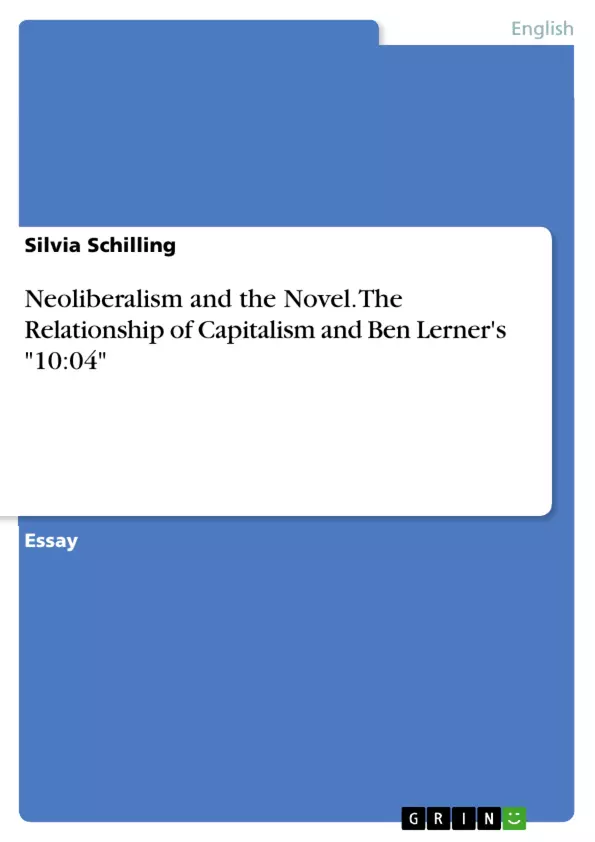As a response to a quote by Theodore Martin in his text “The Dialectic of Change”, this essay analyzes the ways in which Ben Lerner´s novel "10:04" is embedded in capitalism as well as the ways in which it is able to overcome the market. The complex interrelation between neoliberalism and the novel is discussed and analyzed in detail.
Inhaltsverzeichnis (Table of Contents)
- Neoliberalism and the Novel
- The Golden Vanity: An Example of Neoliberalism's Influence on Literature
- The Art of Resistance
- The Time of the Novel and the Time of Neoliberalism
- The Future of the Novel
- The Homo Oeconomicus and the Novel
- Conclusion
Zielsetzung und Themenschwerpunkte (Objectives and Key Themes)
This essay analyzes the complex relationship between Ben Lerner's novel 10:04 and neoliberalism, examining how the text both resists and succumbs to the economic logic that permeates contemporary life. The essay argues that 10:04 offers a nuanced perspective on the entanglement of art and economy, exploring the ways in which the novel itself becomes a product of the marketplace while simultaneously attempting to subvert its influence.
- The influence of neoliberalism on art and literature
- The concept of "totaled art" and its relationship to the market
- The temporal and spatial dimensions of the novel as a resistance to neoliberalism
- The portrayal of the "homo oeconomicus" and its implications for human connection
- The contradictions inherent in the novel's engagement with neoliberal logic
Zusammenfassung der Kapitel (Chapter Summaries)
- The essay begins by examining the relationship between neoliberalism and the novel, challenging the notion that art can be either completely subsumed by or entirely autonomous from economic forces. Drawing on the work of Mathias Nilges, the essay argues that culture exists in a mediating space between economic structure and its social dimension, creating a necessary tension when examining capitalism's contradictions.
- The essay then analyzes the concept of "totaled art" in 10:04, suggesting that the novel's exploration of art that has been declared worthless may offer insights into the status of the text itself. Jennifer Ashton's argument that 10:04 has become a "totaled artwork" through self-sabotage is explored, with the essay questioning the potential for intentional damage in art.
- The essay further examines the novel's engagement with the influence of market pressures on literature through the incorporated short story "The Golden Vanity." While this story acknowledges economic influences, it also trains the reader to recognize and subtract them from the work.
- The essay discusses the novel's use of time and space to resist neoliberal logic, highlighting the novel's ability to question temporal dimensions and engage with the past, present, and future. The essay also explores the novel's portrayal of anxieties about the future, connecting them to the paralyzing effect of neoliberalism on cultural imagination.
- The essay concludes by examining the novel's portrayal of the "homo oeconomicus" and the ways in which it both succumbs to and subverts the idea of individuals as economic actors. The essay explores the contradictions inherent in the novel's portrayal of human connections in a neoliberal world.
Schlüsselwörter (Keywords)
This essay focuses on the relationship between the novel and neoliberalism, examining themes such as economic logic, the entanglement of art and economy, "totaled art," temporal and spatial dimensions, the "homo oeconomicus," and the contradictions inherent in resisting neoliberal influence.
Frequently Asked Questions
What is the central theme of the essay on Ben Lerner's '10:04'?
The essay explores the complex relationship between neoliberalism and the contemporary novel, specifically how '10:04' both succumbs to and resists capitalist market logic.
What does the term 'totaled art' mean in this context?
It refers to art that has been declared worthless by the market (like a 'totaled' car). The novel investigates if such art can offer a form of resistance to economic valuation.
How does the novel portray the 'homo oeconomicus'?
The novel depicts individuals as economic actors whose connections are permeated by neoliberal logic, while simultaneously attempting to find spaces for authentic human connection.
In what way does '10:04' use time to resist neoliberalism?
By questioning temporal dimensions and engaging with the past and future, the novel resists the 'paralyzing' focus of neoliberalism on the immediate present and market efficiency.
Can art be entirely autonomous from economic forces?
The essay argues that culture exists in a mediating space; it cannot be completely free from economic structures, but it creates a tension that allows for the subversion of capitalist contradictions.
- Citation du texte
- Silvia Schilling (Auteur), 2018, Neoliberalism and the Novel. The Relationship of Capitalism and Ben Lerner's "10:04", Munich, GRIN Verlag, https://www.grin.com/document/520754



